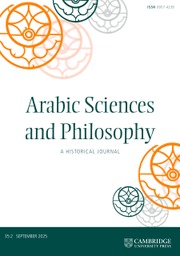Article contents
AVICENNA ON GRASPING MATHEMATICAL CONCEPTS
Published online by Cambridge University Press: 03 March 2021
Abstract
According to Avicenna, some of the objects of mathematics exist and some do not. Every existing mathematical object is a non-sensible connotational attribute of a physical object and can be perceived by the faculty of estimation. Non-existing mathematical objects can be represented and perceived by the faculty of imagination through separating and combining parts of the images of existing mathematical objects that are previously perceived by estimation. In any case, even non-existing mathematical objects should be considered as properties of material entities. They can never be grasped as fully immaterial entities. Avicenna believes that we cannot grasp any mathematical concepts unless we first have some specific perceptual experiences. It is only through the ineliminable and irreplaceable operation of the faculties of estimation and imagination upon some sensible data that we can grasp mathematical concepts. This shows that Avicenna endorses some sort of concept empiricism about mathematics.
Résumé
Selon Avicenne, certains objets des mathématiques existent et d'autres non. Chaque objet mathématique existant est un attribut connotationnel non sensible d'un objet physique et peut être perçu par la faculté d'estimation. Les objets mathématiques non existants peuvent être représentés et perçus par la faculté d'imagination en séparant et en combinant des parties d'images d'objets mathématiques existants qui sont précédemment perçues par estimation. Dans tous les cas, même les objets mathématiques non existants doivent être considérés comme des propriétés d'entités matérielles. Ils ne peuvent jamais être saisis comme des entités totalement immatérielles. Avicenne pense que nous ne pouvons saisir aucun concept mathématique à moins d'avoir au préalable des expériences perceptives spécifiques. Ce n'est que par l'opération non éliminable et irremplaçable des facultés d'estimation et d'imagination sur certaines données sensibles que nous pouvons saisir les concepts mathématiques. Cela montre qu'Avicenne approuve une sorte d'empirisme conceptuel sur les mathématiques.
- Type
- Research Article
- Information
- Creative Commons
- This is an Open Access article, distributed under the terms of the Creative Commons Attribution licence (http://creativecommons.org/licenses/by/4.0/), which permits unrestricted re-use, distribution, and reproduction in any medium, provided the original work is properly cited.
- Copyright
- Copyright © The Author(s), 2021. Published by Cambridge University Press
- 2
- Cited by




